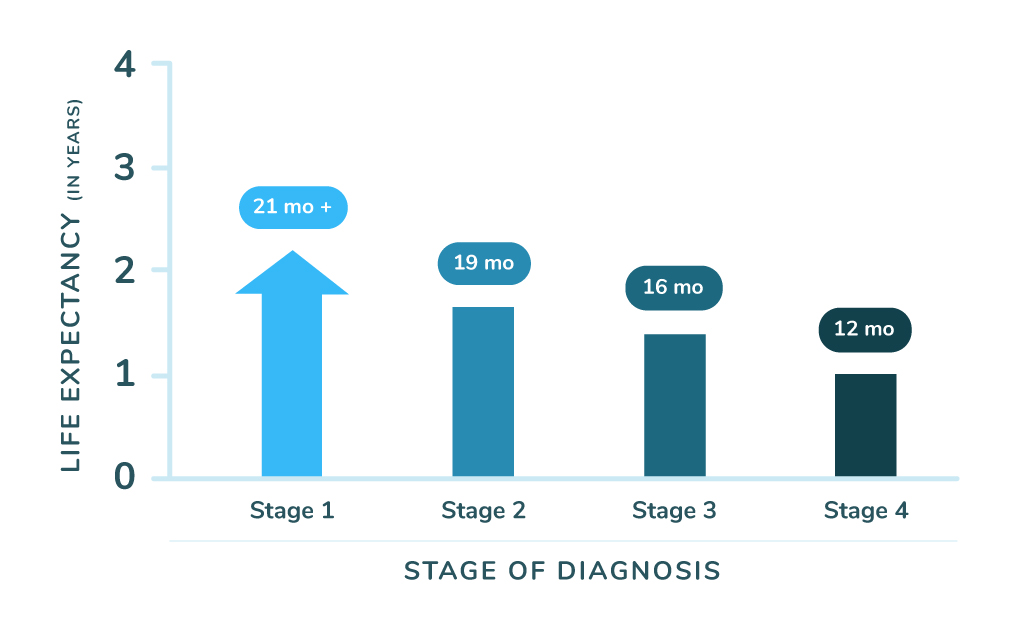Mesothelioma Prognosis & Life Expectancy
Significant advances in mesothelioma research have been made in the last decade leading to improved life expectancy.
One of the first questions that most individuals faced with a life-threatening illness ask is "how long do I have to live?" While it is a difficult question for the patient to ask, it is an equally difficult one for their medical team to respond to as every case is different and dependent on a number of different factors.
Overall, the prognosis for mesothelioma patients has not been favorable. Malignant mesothelioma is known to be extremely aggressive and it is characterized by a long latency period meaning most cases are not detected until the disease has reached advanced stages. As a result, the average life expectancy following diagnosis is usually just a year or two.
However, that doesn't mean that there aren't exceptions and there is good news! In recent years, statistics have been improving as advances in medical technology lead to earlier detection of the disease, more effective implementation of existing treatment options, and the development of new and novel treatment options.
Determining Your Prognosis
Today there are a variety of factors that can affect the prognosis and outlook for a mesothelioma patient. These include:
Type of Mesothelioma Diagnosed
Mesothelioma is classified as one of three subtypes: epithelial, sarcomatoid and biphasic. A subtype is determined based on the types of cells that are involved. epithelial mesothelioma accounts for about 50% of all diagnosed cases, sarcomatoid mesothelioma is reported in approximately 15% of patients, and biphasic mesothelioma is seen in about 35% of cases. The biphasic subtype is a combination of epithelial and sarcomatoid subtypes). Epithelial mesothelioma generally has a more favorable survival rate than the more aggressive sarcomatoid or biphasic subtypes.
Location of the Tumor
Mesothelioma typically affects one of three major organs in the body. Pleural mesothelioma, originates in the lining of the lungs, and is the most common form of mesothelioma, accounting for approximately 80% of all cases. The median survival rate for those diagnosed with pleural mesothelioma is 12 months. Peritoneal mesothelioma originates in the peritoneum or the lining of the abdomen and is the second most-common location in the body for mesothelioma to develop. About 10 -20 percent of mesothelioma victims are diagnosed with this form of mesothelioma. Peritoneal mesothelioma that is diagnosed in the advanced stages of the disease can be more difficult to treat and has a lower survival rate. Pericardial mesothelioma originates in the lining of the heart, also known as the pericardium. Pericardial mesothelioma is extremely rare, and carries a less favorable prognosis than pleural or peritoneal mesothelioma. Also very rare is testicular mesothelioma. It originates in the tunica vaginalis (testicular lining). If diagnosed before metastasis has occurred, the prognosis for this type of mesothelioma is usually very good and carries a high survival rate.
Stage of the Cancer
The sooner that mesothelioma is diagnosed, the earlier treatment can begin. Those who can receive treatment in the early stages of the disease typically receive a more favorable prognosis. Unfortunately, in the earlier stages of the disease there are few, if any, detectable symptoms. When a diagnosis is finally made, the cancer has usually progressed to Stage 3 or 4. Anyone exhibiting persistent upper respiratory symptoms having a prior history of working with asbestos, should receive a medical attention from their physician. Time is of the essence and an earlier diagnosis will result in a better prognosis.

Metastasis to Other Areas of the Body
When a mesothelioma diagnosis is finally made, the doctor (typically a surgeon or oncologist) may perform tests to determine whether the cancer has spread, or "metastasized," from its primary location to other parts of the body, such as nearby organs and/or lymph nodes. The extent of the metastasis, if any, will help the doctor to determine the best type of treatment, and can also be a factor in the prognosis. If the cancer has metastasized to other organs and/or or the lymph nodes, curative surgical treatment is not typically performed, although this must be determined on a case-by-case basis by the medical team. Chemotherapy may be recommended, or, in some cases, chemotherapy followed by curative surgical treatment, may be an option. If the stage is advanced and/or if the patient is not able to undergo chemotherapy, palliative care may be offered to alleviate symptoms and maximize patient comfort.
Additional Mesothelioma Prognosis Terminology
Mesothelioma Survival Rate
Most survival rates for cancer are determined based on a relative five-year survival rate. This rate indicates the percentage of patients who have survived five years after their cancer diagnosis. The five-year survival rate for mesothelioma victims is currently just 10 percent, while the one-year survival rate for is about 40 percent. Both rates have increased significantly in the last 10 years.
Mesothelioma Remission
One of the most aggressive types of cancer, mesothelioma quickly metastasizes from its point of origin into the lungs, abdominal cavity, and lymph nodes. Because of this, very few mesothelioma patients go into remission. If treated properly and early enough, however, it is possible for patients to experience extended survival rates beyond earlier expectations.
Mesothelioma Cure
While there is still no cure for mesothelioma, significant advances in mesothelioma research have been made over the past ten years. As a result, new tests have been developed, and are being developed, to help medical professionals detect the cancer earlier. A wide range of new treatment options are becoming available that may lead to improved life expectancy for mesothelioma victims.
Don't wait until it is too late to protect your rights! The evaluation will cost you nothing.

Improving a Mesothelioma Prognosis
During the last decade more research dollars have been funneled towards the study of mesothelioma and the discovery of new and novel drugs and treatments to provide more hope of a better prognosis for the mesothelioma sufferer.
Scientists have been working on new tests aimed at diagnosing mesothelioma at an earlier stage. The Mesomark™ assay, for example, is a simple blood taste that measures the rate of Soluble Mesothelin-Related Peptides (SMRP) present in the blood. This biomarker is released by mesothelioma cells into the bloodstream and SMRP can be raised for many years before symptoms appear and a conclusive cancer diagnosis is made. This early diagnosis tool, while still in the experimental stages, could potentially help to save hundreds of lives.
Each new step in the field of mesothelioma research is a critical one and, little by little, improves the mesothelioma prognosis for patients. This gives both patients and their loved ones an increasing sense of hope.
Mesothelioma Survivors
Heather Von St. James, a wife and mother, undertook a courageous battle with mesothelioma cancer at the young age of 36. Read about her story and the message of hope that it brings.
Heather Von St. James

Today, Heather Von St. James shares her message of hope and survival with mesothelioma victims around the world. At the age of 36, just three months after giving birth to a baby, Heather received the news that she had mesothelioma, a type of asbestos cancer. The news was devastating for both Heather and her husband, Cameron, but together, with tremendous faith, hope and Heather's iron will to live, they bravely evaluated available treatment options with her doctors. After learning that the conventional treatment protocols consisting of chemotherapy and radiation would give Heather five years to live at best, they were open to considering a much riskier option that involved the removal of Heather's lung, pericardium and diaphragm. This groundbreaking procedure, called extrapleural pneumonectomy, had recently been developed by Dr. David Sugarbaker. Although this procedure possessed a fair amount of risk, it carried a more favorable prognosis and promise for a greater life expectancy. The young couple courageously decided to take the riskier route. On February 2, 2006 Heather had the surgery and received chemotherapy for several months following the procedure. Today she is joyfully alive, deeply grateful and excited to share her personal story of hope and inspiration with mesothelioma patients everywhere.
Request a Free Case Evaluation
Request a free case evaluation now if you or someone you love has been diagnosed with mesothelioma. The evaluation will cost you nothing. Our lawyers will travel to visit you at your convenience or conference call with you over the phone. We understand how difficult a time this is for you and will assist in any way that we can. You can also call us toll-free at 1-800-336-0086 at any time.
 Medically Reviewed by
Dr. F. Perry Wilson
Medically Reviewed by
Dr. F. Perry Wilson
Dr. F. Perry Wilson is a board-certified physician. He serves as Associate Professor of Medicine at the Yale University School of Medicine and is the Interim Director at the Yale Program of Applied Translational Research. Dr. Wilson is a contributor on the Elslaw.com editorial team and is responsible for ensuring that all medical content is accurate.
Learn
More


Results
The jury awards and settlements we have received for our clients are among the highest in the country.
Occupation/Exposure
Mechanic
Age
66
State
WA
Results
~$102,200,000
Occupation/Exposure
Cosmetic Talc User
Age
75
State
AZ
Results
~$22,200,000
Occupation/Exposure
Talc Powder User
Age
59
State
UT
Results
~$20,000,000
Occupation/Exposure
Home Renovator
Age
75
State
RI
Results
~$15,100,000
Occupation/Exposure
Electrician
Age
62
State
NV
Results
~$13,800,000
Occupation/Exposure
Plumber
Age
49
State
CA
Results
~$13,500,000
Occupation/Exposure
Abatement Worker
Age
70
State
CT
Results
~$12,600,000
Occupation/Exposure
Pipefitter
Age
58
State
OH
Results
~$12,200,000
Occupation/Exposure
Pipefitter
Age
65
State
NV
Results
~$12,000,000
Occupation/Exposure
Navy Veteran
Age
48
State
CA
Results
~$11,700,000
Occupation/Exposure
Air Force Veteran
Age
84
State
KY
Results
~$11,700,000
Occupation/Exposure
Hairdresser
Age
66
State
MD
Results
~$11,500,000
